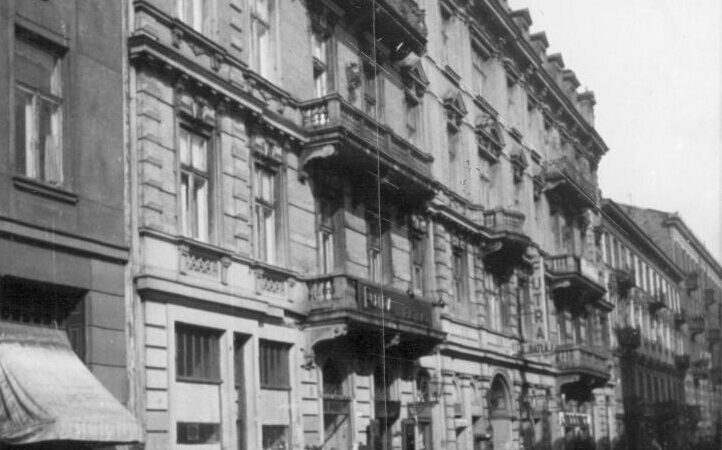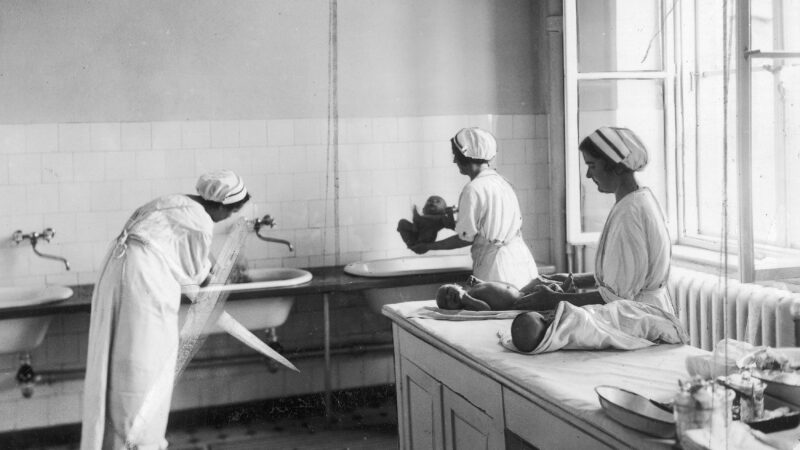Ms Ziuta’s invisible tenants: How Alicja and Leon Guz wrenched themselves from the clutches of the Third Reich
‘It seemed with my wife I was safe, that with her, nothing bad could happen to me’ – this is how Alicja Guz’s husband, Leon, thought of her during the darkest period of the occupation. He was right. With her energy, good looks and acting skills, she helped four other Jews survived the occupation in a hideout in Warsaw’s Praga district. The help offered by a number of Christians, including Apolonia Przybojewska, later awarded the title of Righteous Among the Nations, was also significant.
It was a frosty December morning in 1942. Over three months had passed since the liquidation of the ghetto in Minsk Mazowiecki. The Jews who had managed to survive the August hecatomb were working at several sites in the city, including the Rudzki factory complex, which manufactured metal products. Among them were the young Guzes – twenty-eight-year-old Leon and twenty-seven-year-old Alicja.
Both of them had miraculously eluded the German death machine on numerous occasions. Now they were absolutely determined to survive. Only a few weeks earlier, their daughter Basia had been born. Immediately after her birth, with the help of a non-Jewish acquaintance, they gave the infant up to the Father Boduen House for Young Children. They felt that their daughter had a better chance of survival there. And they dreamt of reuniting with her. Meanwhile, they found themselves one step away from tragedy.
At one point, one of the Jewish workers rushed into their quarters in the factory’s power plant, alerting them that the factory was surrounded by Germans. The Guzes immediately rushed to a preplanned hiding place. It was a shed far away from the main buildings of the complex, where compracted bales of wood shavings were stored. The couple pushed them aside and hid behind them.
‘With our hearts beating hard, we listened for sounds from the factory area. Suddenly we heard someone approaching the shed. From the heavy footsteps we guessed that it was a German. We held our breath’, Leon Guz recounted years later. After a while, they came face to face with a gendarme.
‘This is the end, I thought. Meanwhile, the gendarme, without saying a thing, looked at us intently and put his finger to his lips. Without a word, he began restacking the bales of wood shavings. A second German appeared in the shed asking him if he had found anyone. “No”, he replied “there’s no one here”. Hearing those words, I thought I was dreaming,’ Guz recalled.
The couple sat in the hideout for another few hours. They only came out when they heard the voices of their fellow sufferers outside. Unlike the ten Jews the Germans took from the factory to be shot, once more they were lucky. Soon fortune smiled on them again. They ended up in an asylum, where they survived the invasion of the Red Army.
Valuable as life itself
The couple came from low-income Jewish households. Leon (Lejb) was born in 1914 in Kowel in Volhynia. In the interwar period, his family settled in Warsaw. Shortly before the outbreak of war, his mother died. During the bombardment of Warsaw in September 1939, his brother Szymon was fatally wounded. Until the spring of 1941, he lived in a tenement house at 40 Zamenhofa Street, first with just his father and younger brother, Zelig, and then with his wife as well.
Born in 1915, Alicja Guz (Surla Matla Szarfsztejn) came from Minsk Mazowiecki. Her parents ran a shop there. She had two brothers: the younger was Szlamek and the elder Gerszon (in her memoirs, Guz uses his post-war first and last name – Tadeusz Skoczeń). From the age of sixteen, she lived in Warsaw, where she hired herself out as a babysitter. She met Leon by chance in Michalina, near Otwock, towards the end of 1938. They tied the knot on 10 December 1939, at a modest ceremony in the German-occupied capital. They soon moved in together.
During the nightmare of war, when the Jewish population was hit by a string of repressions, Leon had moments of doubt – he temporarily slipped into apathy. As he repeatedly emphasised in his memoirs, it was only Alicja’s presence that made him feel safe and give him the energy to continue the fight for survival. She was quick, courageous and resourceful. On top of that, she had qualities that made it much easier to navigate the German terror.
‘She spent her entire youth in a Polish neighbourhood, her features in no way resembled her fellow countrymen, at school she only made friends with Poles, and finally, without stammering, she was able to run through prayers, and responded to moments of surprise or fright with “oh Jesus”. As it later turned out, these were worth their weight in gold, as valuable as life itself’.
The escape from hell
At the outbreak of war, Leon Guz was the sole breadwinner in his family. He worked in a wholesale fur warehouse at 32 Świętojerska Street. When the Germans entered the city, he recalled, the terrified business owner was ready to give them all the precious merchandise if it came to a requisition. This meant he and two co-workers hid the bulk of the goods with Christian contractors. These he began to trade, earning sizeable savings. Thanks to this money, he and his household had a good life until the summer of 1940; almost, as he put it, ‘carefree’. They had plenty of food and the flat was teeming with guests.
However, as this financial cushion began to melt away and the cost of living in the Jewish quarter rose, Guz was unable to find an equally lucrative source of income. More businesses, such as the potato trade, failed to bring him much profit. The futility of these efforts, his inactivity, the closing of the ghetto in November 1940 and the constant threat of German repressions, such as deportations to the notorious labour camps, caused the twenty-six-year-old to become depressed. He began losing weight and languishing before his own eyes. Alicja became concerned, and told him to leave Warsaw for her family home in Minsk Mazowiecki, where things were much quieter. Interestingly, Guz arrived there in safety and comfort with a group of other Jews on the back of a German military truck. They were escorted by Wehrmacht soldiers bribed by Gershon Szarfsztejn, Leon’s brother-in-law.
The darkest days
In the Minsk ghetto, with over 5,000 people crowded in, living conditions were fairly bearable. The ghetto was not fenced off, so Jews were able to move about the city relatively freely.
Guz moved in with his in-laws on the first floor of a wooden house at 6 Mireckiego Street. Shortly after moving in, his brother-in-law, who was a group leader of Jewish workers at outposts, arranged work for him on the construction of a German military airfield in nearby Janów. This gave Leon the opportunity to watch Hitler’s troops prepare for the invasion of the USSR.
Later, Guz worked successively at the railway station, Red Cross warehouses and the ‘saturation plant’, where railway sleepers and traction poles were waterproofed.
Meanwhile, Alicja had arrived in June 1941, and began trading between Minsk and the Warsaw ghetto. She exported food to Warsaw and brought back clothes, for example, making a tidy profit. She tried to minimise the risks. She had an official Judenrat railway pass. Because of her ‘suitable appearance ’, she was not harassed by blackmailers. She would enter the ghetto, depending on the circumstances, through smuggling routes – mainly tenement houses adjacent to the closed district boundaries – the district courts on Leszno Street or simply through the gates when it was known that all the guards had been bribed. The risks were life-and-death, and there were never any major slip-ups.
The darkest period for the Guzes came in the second half of 1942. First, they got the horrifying news of the ‘big sting’ in the Warsaw Ghetto. Leon’s father and brother had miraculously escaped to the ‘Aryan side’. They were then evacuated to Minsk by Gershon Szarfsztejn and his partner, thirty-three-year-old Apolonia Przybojewska, a Pole with German roots.
In the morning of 21 August, a particularly brutal operation began in the Minsk ghetto. The Germans and their Ukrainian and Latvian collaborators murdered approximately a thousand people on the spot.
‘We entered the Jewish quarter. It was a horrifying sight,’ Guz reported, ‘It seemed I had entered a cemetery or a dead city. Both sides of the street, the pavements, the gates of the houses were strewn with corpses. Some were still alive, moving, staring at us with pleading eyes. I looked for my loved ones among these victims’.
During those days, Leon’s father and brother and Alicja’s parents and younger brother were sent to the Treblinka death camp. Of the two families, only the Guzes and Gerszon Szarfsztejn survived the action.
Leon was exceptionally lucky. He had already found himself in the throng of Jews waiting at Minsk station for the train to the death camp. Then he noticed a drunk Ukrainian guard had fallen asleep at the wicket he was guarding. Not stopping to think, Guz crawled up and jumped over him, then started to run away, all without being noticed. He then hid for a few days in the ‘saturation area’. Interestingly, food was brought to him at that time by a worker active in the local underground structures of the national camp.
The Guzes were among about 400 surviving Minsk Jews. For the months that followed, Leon lived and worked in Rudzki’s factory, mentioned above. Meanwhile, in late November 1942, Alicja had a daughter, Basia. With the help of Dr Olgierd Mackiewicz, she was able to give birth at the local maternity centre. Incidentally, the medic was linked to Żegota, a humanitarian organisation affiliated with the Government Delegation for Poland, dedicated to helping Jews.
A week after the birth, they decided upon a dramatic step. Through Przebojewska, they gave the girl to an orphanage at 75 Nowogrodzka Street in Warsaw. Later, Alicja visited the child with her from time to time. In order to ease suspicions, they told the nuns running the institution that they wanted to check how ‘their orphan’ was doing.
A refuge in Praga
After the incident described in the introduction, the Guzas became acutely aware that staying in Rudzki’s factory meant death. They had to find a safe hiding place. And then, unexpectedly, the wife of a Polish engineer at the factory – not a close acquaintance, we should add – handed Alicja the original certificate of a girl sent to work in the Reich. With this document, Leon’s wife produced a kennkarte for herself and began living on ‘Aryan papers’ as Józefa Sowa.
The next step was to rent a flat. As they did not have the funds, they had to find partners with enough to cover it. And so they co-opted Moshe Zyserman, his wife Tauba and younger brother Herszek, who had a considerable supply of dollars, into the survival group.
In the early days of January 1943, Alicja, rented a flat at 64/121 Targowa Street with the help of Przebojewska. The flat had about twenty square metres and was in the attic of an apartment building.
As soon as all five tenants were in the flat, an additional wall was built of boards under the sloping roof, thus creating a hiding place. The Zysermans and Leon would hide there whenever visitors came to see Ms Ziuta – the only official tenant.
Responsibility for the survival of the entire group rested on Alicja’s shoulders. It was she who provided them with provisions (she bought small amounts in several shops so as not to arouse suspicion), water (she couldn’t make too many trips up the stairs with a bucket), disposed of waste in the corridor toilet (which also, despite what we may assume, required a clandestine approach to avoid drawing attention). And above all, she skilfully played the lonely Christian woman for her neighbours, quickly winning their sympathy. She even took care of such details as organising Józefa’s name day.
To keep up appearances, Ms Ziuta found a job in the newspaper that was convenient for the whole company. And so, officially, she earned money by gluing paper bags for a Praga cooperative in her flat. In reality, Leon and the Zysmans were happy to do this job for her – it was their way of killing the boredom of everyday life.
The whole group – including Gerszon Szarfsztajn, who joined them during the last weeks – managed to survive on Targowa Street without any major incidents until Praga was occupied by the Red Army. On 14 September 1944, they were able to come out of hiding.
Their post-war fate
After the war, the Guz family settled first in Mińsk Mazowiecki before moving to Warsaw. Besides their daughter Basia, whom they reclaimed from the orphanage in 1945, they had a son, Jerzy, born in 1947. In 1968, Alicja suffered a heart attack from the emotional impact of the events of March ‘68, and was ill for many years afterwards. She died in 1980. Leon, who was a long-time journalist for Trybuna Ludu after the war, lived until 2010, passing away at the age of 95.
Apolonia Przebojewska received the title of Righteous Among the Nations in 1984 for helping the Guzes. We may conclude from Leon’s memoirs, Targowa 64, that many other non-Jewish Poles were involved in helping the Guzes as well.
In writing this text, I have relied in part on Leon Guz’s book Targowa 64. Dziennik 27.01.1943-11.09.1944, Warsaw 1990.



